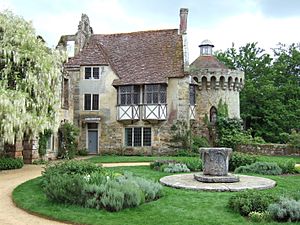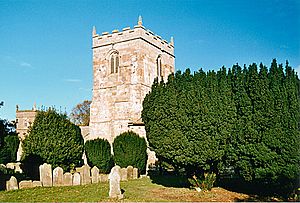Barnabe Googe facts for kids
Quick facts for kids
Barnabe Googe
|
|
|---|---|
| Born | 11 June 1540 Alvingham, Lincolnshire |
| Died | c. 7 February 1594 Alvingham, Lincolnshire |
| Spouse(s) | Mary Darrell |
| Issue | Matthew Googe Thomas Googe Barnabe Googe William Googe Henry Googe Robert Googe Francis Googe Mary Googe |
| Father | Robert Googe or Goche |
| Mother | Margaret Mantell |
Barnabe Googe (born June 11, 1540 – died around February 7, 1594) was an English poet and translator. He is known as one of the first English poets to write about country life and nature, a style called pastoral poetry. His name is sometimes spelled Barnabe Goche or Barnaby Goodge.
Contents
Early Life and Education
Barnabe Googe was born in Alvingham, a town in Lincolnshire, England, on June 11, 1540. His father was Robert Googe, and his mother was Margaret Mantell. Sadly, his mother passed away when he was only six weeks old. He was likely raised by his grandmother, Lady Hales, in Kent.
Barnabe's father later married Ellen Gadbury, who became his stepmother. Barnabe did not get along well with her.
When his father died in 1557, Barnabe inherited some land and a house. He went on to study at Christ's College, Cambridge and New College, Oxford, but he didn't finish his degrees at either university.
Because he was still young when his father died, Barnabe became a "ward of the Queen." This meant that Queen Elizabeth I was in charge of looking after his inheritance until he was old enough. He was able to buy his own wardship back from the Queen's government.
Barnabe also became a member of Staple Inn, a place where young men studied law. Here, he met other writers and thinkers, including his cousin, Alexander Neville.
Working for the Queen
Barnabe Googe had a very important connection: he was a distant relative and a "servant" to William Cecil, who was a powerful advisor to Queen Elizabeth I. This connection helped Barnabe a lot.
In 1562, Cecil encouraged Barnabe to travel to Spain with Sir Thomas Challoner, a scholar and diplomat. This was an important experience for Barnabe.
While he was away in Spain, something unexpected happened. A friend named Laurence Blundeston sent some of Barnabe's early poems to a printer. When Barnabe returned, he was surprised but agreed to let them be published.
His book, called Eglogs, Epytaphes, and Sonettes, came out in 1563. This was a big deal because Barnabe Googe was one of the very first English writers to publish his own poems under his real name.

Marriage and Later Life
Barnabe Googe married Mary Darrell. Her family lived at Scotney Castle in Kent. At first, Mary's father didn't want them to marry, but Barnabe asked his powerful relative, Sir William Cecil, for help. With Cecil's support, Barnabe and Mary were able to marry in 1564 or 1565.
They had seven sons: Matthew, Thomas, Barnabe, William, Henry, Robert, and Francis. They also had one daughter, Mary.
Barnabe continued to serve the Queen's government. In 1569, he went on a military trip to Ireland, where he became very sick. In 1571, he became a Member of Parliament (MP) for Aldborough, Yorkshire.
Later, in 1582, he was given another job in Ireland as a "provost-marshal" in a region called Connaught. This job was difficult, and Barnabe often wrote to Lord Burghley (William Cecil) saying how much he missed his family and his home in England. He called the people there "Scythians," meaning he felt like he was living among uncivilized people.
Barnabe eventually managed to sell his position in Ireland and return home. He inherited more money when his stepmother passed away in 1587.
His last known letter was written in 1587, mentioning his new home in Alvingham. He is believed to have retired there and lived out the rest of his life. Barnabe Googe died in Alvingham around February 7, 1594, and was buried in Cockerington church.

Barnabe Googe's Poetry
Barnabe Googe's poems are written in a "plain style." This means they are direct and honest, focusing on serious topics rather than being overly fancy or decorative. This style was common before the more elaborate "Petrarchan style" became popular. Other poets like George Turberville and George Gascoigne also wrote in a similar way.
Googe was a strong Protestant, and his religious and political beliefs often showed up in his poetry. For example, in one of his poems, he wrote about how he felt the old noble families were losing their power, and new wealthy people were becoming important. He also wrote about the struggles of Protestants during the time of Queen Mary I.
He also wrote about love, moving from earthly love to a more spiritual, heavenly kind of love. His book included poems honoring other writers like Nicholas Grimald and Thomas Phaer.
Googe made an important contribution to pastoral poetry in English. His poems combined ideas from old classical poems, the work of a poet named Mantuan, and Spanish romance stories. He was one of the first English writers to show the influence of a Spanish book called Diana Enamorada.
Other Works and Translations
Besides his own poetry, Barnabe Googe was also a busy translator. He translated several important books from Latin and other languages into English:
- The Zodyake of Life (1560): This was a translation of a Latin poem by Marcellus Palingenius. It became a textbook in English schools and was popular because it was seen as a Reformist (Protestant) text.
- The Popish Kingdome, or reign of Antichrist (1570): Translated from Thomas Kirchmeyer, this book was about criticizing the Catholic Church.
- Foure Bookes of Husbandrie (1577): This book, collected by Conradus Heresbachius, was about farming and agriculture. It was very popular and was reprinted many times.
- The Overthrow of the Gout (1577): A translation about a medical topic.
- The Proverbes of Lopes de Mendoza (1579): A collection of proverbs.
His translations, especially The Zodyake of Life and The whole art of husbandry, were very influential and helped spread new ideas and knowledge in England during his time.
See also
 | Aaron Henry |
 | T. R. M. Howard |
 | Jesse Jackson |

